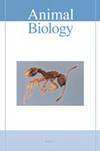巴基斯坦玛加拉山国家公园同域食肉动物分布格局、栖息地关联及粪便学常规与分子鉴定的比较
IF 0.9
4区 生物学
Q2 ZOOLOGY
引用次数: 0
摘要
了解物种的分布对制定有效的保护计划非常重要。在巴基斯坦,人们对共存于同一地区的大多数食肉动物的状况和分布知之甚少。为了解决这一知识差距,我们研究了马加拉山国家公园共存食肉动物的分布模式,使用了传统的、dna鉴定的粪便和其他标志。尽管粪便调查仍然是研究食肉动物的一种流行方法,但仅基于形态学的粪便识别容易出错。因此,作为我们研究的一部分,我们利用遗传技术评估了粪便形态鉴定的准确性。实地调查于2015年9月至2018年12月进行。利用593种直接(目击、相机诱捕、道路捕杀)和间接(粪便、脚印)野外标记,共检测到11种食肉动物,其中10种在248种(47.7%)粪便DNA鉴定子集中有代表性。分子分析结果表明,红狐(Vulpes Vulpes)的误认率最高(8.47%),其次是亚洲豺(Canis aureus)(7.66%),印度小果子狸(viverrica indica)的误认率最低(3.63%)。为了研究食肉动物栖息地的相关性,并检验物种存在与归一化植被指数(NDVI)之间的相关性,我们将各物种存在点的NDVI均值和标准差与23个样带的NDVI均值和标准差进行了比较。基于dna验证和所有标本,食肉动物物种的平均NDVI存在一定范围,初步表明某些物种可能比其他物种利用更多的生境类型多样性。本文章由计算机程序翻译,如有差异,请以英文原文为准。
Distributional patterns and habitat association of sympatric carnivores in Margalla Hills National Park, Pakistan, and a comparison of conventional versus molecular identification in carnivore scatology
Abstract Knowledge of a species’ distribution is important for developing effective conservation programs. In Pakistan, little is known about the status or distribution of most carnivores coexisting in the same landscape. To address this knowledge gap, we studied distribution patterns of coexisting carnivores in Margalla Hills National Park, using both conventional as well as DNA-identified scats, and other signs. Although scat surveys remain a popular approach to study carnivores, scat identification based on morphology alone is error-prone. As part of our study, we therefore evaluated accuracy of morphological identification of scats using genetic techniques. Field surveys were conducted from September 2015 to December 2018. Using 593 direct (sighting, camera trapping, road kills) and indirect (scats, footprints) field signs, we detected total 11 carnivore species in the park, including 10 that were represented in the subset of 248 (47.7%) scats identified from DNA. The molecular analyses confirmed that the misidentification rate was highest for red fox ( Vulpes vulpes ) (8.47%), followed by Asiatic jackal ( Canis aureus ) (7.66%), but least for small Indian civet ( Viverricula indica ) (3.63%). For investigating habitat association of carnivores, and to test for the associations between species presence and Normalized Difference Vegetation Index (NDVI), we compared the mean and standard deviation of NDVI of each species’ presence locations with the mean and standard deviation of NDVI along the 23 sampling transects. Based on DNA-verified and all scats, carnivore species showed a range of mean NDVI, suggesting, preliminarily, some species may utilize a greater diversity of habitat types than others.
求助全文
通过发布文献求助,成功后即可免费获取论文全文。
去求助
来源期刊

Animal Biology
生物-动物学
CiteScore
2.10
自引率
0.00%
发文量
34
审稿时长
3 months
期刊介绍:
Animal Biology publishes high quality papers and focuses on integration of the various disciplines within the broad field of zoology. These disciplines include behaviour, developmental biology, ecology, endocrinology, evolutionary biology, genomics, morphology, neurobiology, physiology, systematics and theoretical biology. Purely descriptive papers will not be considered for publication.
Animal Biology is the official journal of the Royal Dutch Zoological Society since its foundation in 1872. The journal was initially called Archives Néerlandaises de Zoologie, which was changed in 1952 to Netherlands Journal of Zoology, the current name was established in 2003.
 求助内容:
求助内容: 应助结果提醒方式:
应助结果提醒方式:


